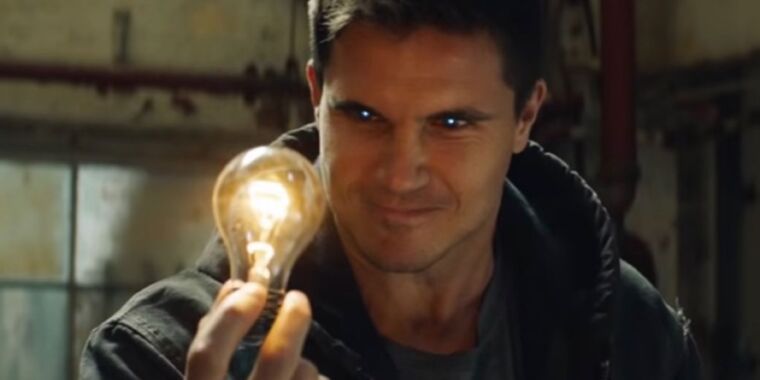Review: Gritty techno-thriller Code 8 is a surprise breakout hit on Netflix

One of the surprise breakout hits on Netflix during the coronavirus shutdown is Code 8, a Canadian science-fiction film funded entirely through a crowdfunding campaign. It’s set in an alternate timeline in the 1990s, where people with superhuman powers face severe discrimination and economic hardship. But this isn’t a cheap rip-off of the X-Men franchise. Code 8 is a smart, gritty, techno-noir thriller that is equal parts X-Men, District 9, and classic heist movies (Ben Affleck’s The Town is probably closest in tone and themes).
(Some spoilers below, but no major reveals.)
Directed by Jeff Chan, Code 8 began life as a short teaser film of the same name, produced by cousins Robbie Amell (star of the forthcoming Upload) and Stephen Amell (Arrow) in 2016. They launched an Indiegogo fundraiser that year to make a feature-length version and soon raised $2.4 million. By December of last year, when the film was officially released, they had raised $3.4 million altogether, with the extra funds going to cover promotional and distribution costs, as well as perks for the more than 30,000 individual contributors (many of whom are named in the very long credits sequence). The film grossed only $150,000 in theaters but has found a second life on Netflix, where it currently ranks in the Top Ten in terms of viewership.
An opening montage lays out the film’s basic premise with deft strokes. So-called “Powers” emerged at the dawn of the 20th century and are soon required to register their abilities with the government. “Electrics” have electrokinetic abilities, “Pyros” can control fire, Brawns have super strength, “Readers” can read minds, “TKs” are telekinetics, and so forth. Initially, Powers are key workers in the economy, helping build Lincoln City (aka the “City of Tomorrow”)—at least until the rise of mechanization in a Second Industrial Revolution ousts them from their once-valuable jobs.
By the 1990s, Powers are essentially second-class citizens, forced to eke out a bare existence taking on random work off the books. Many turn to crime out of necessity. A powerful syndicate known as The Trust is dealing a novel drug known as Psyke, derived from the spinal fluid of Powers. Meanwhile, the Lincoln City government is debating implementing a new law banning Powers altogether, as a police force reliant on drones, facial recognition, and armed android “Guardians” attempts to stamp out the Psyke trade.
-
Connor Reed (Robbie Amell) is a Class 5 Electric Power eking out a bare subsistence doing odd jobs off the books.YouTube/IGN
-
His mom, Mary (Kari Matchett) has a brain tumor that’s causing her to lose control of her cryo powers.YouTube/IGN
-
How many Electrics does it take to energize a light bulb?Vertical Entertainment/Netflix
-
Desperate for cash for his mom’s operation, Connor falls in with Garrett (Stephen Amell), a telekinetic involved with the local drug syndicate.Vertical Entertainment/Netflix
-
Marcus Sutcliffe (Greg Bryk) is a Reader whose Psyke trade is hit hard by the ongoing police raids.YouTube/IGN
-
The team meets up to plot a chemical plant heist.Vertical Entertainment/Netflix
-
Plotting a bank heist.Vertical Entertainment/Netflix
-
Connor does his electric thing.YouTube/IGN
-
Maddy (Laysla De Oliveira), a Pyro, melts through an armored car.YouTube/IGN
-
Park (Sung Kang) is a detective intent on bringing down the illegal Psyke trade in Lincoln City.YouTube/IGN
-
Checking out surveillance footage from a heist.YouTube/IGN
-
YouTube/IGN
-
Robot “Guardians” augment the police force.Vertical Entertainment/Netflix
-
A clean heist turns violent.YouTube/IGN
-
Sutcliffe’s bodyguard Rhino (Simon Northwood) is a Brawn with bullet-proof skin.YouTube/IGN
-
Garrett tries to take him out anyway.Vertical Entertainment/Netflix
That’s the big picture, but Code 8 is all about the personal narratives, notably the story of Connor Reed (Robbie Amell), a young Class 5 Electric trying to raise enough money to pay for a life-saving operation for his mother Mary (Kari Matchett), whose brain tumor is causing her to lose control of her cryogenic powers. Connor’s father (also an Electric) was killed while committing a robbery when the boy was only five, and Mary has done her best to keep him from following in his father’s footsteps. But desperation leads Connor to join forces with a small team led by a TK named Garrett (Stephen Amell). Their mission: to steal some chemicals for a local crime lord and Reader named Marcus Sutcliffe (Greg Bryk). Things do not go smoothly.
I’ll admit to some skepticism going into the film—the premise seemed hopelessly derivative—but Code 8 quickly won me over with its thoughtful, character-driven depiction of marginalized, increasingly desperate people caught in an impossible situation. That includes police officer Park (Sung Kang), who, for personal reasons revealed later in the film, is still capable of seeing Powers as human beings—even as his bigoted partner, Davis (Aaron Abrams), hurls slurs and suggests planting evidence to frame a key suspect. “Life hits you hard enough, you’re gonna start hitting back,” he observes in one prescient exchange.
Both Amell cousins deliver strong performances, as does much of the cast, especially Matchett as a dying Mary Reed, and Kyla Kane as Nia, a Healer with a Psyke addiction, forced to work for Marcus to pay off her father’s debt. The production quality is generally quite good, which is impressive given the film’s limited budget, and the plot moves quickly, while still allowing enough time for introspective moments. Best of all, the film knows better than to give us an easy happy ending, which would have cheapened all the effort screenwriter Chris Pare devoted to striking just the right tone of bleak resignation. All in all, it’s well worth watching.
Code 8 is currently streaming on Netflix.
Listing image by Vertical Entertainment/Netflix
https://arstechnica.com/?p=1669433